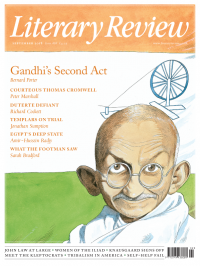Robert Gildea
Continental Shifts
Roller-Coaster: Europe, 1950–2017
By Ian Kershaw
Allen Lane 665pp £30
In a footnote on page 361 of this ambitious work, Ian Kershaw confesses that he ‘entirely missed the world-historical events’ of 9 November 1989, though he was living in West Berlin at the time. A dedicated professor, he spent that evening in a pub with an American PhD student, discussing his thesis, ‘oblivious to what was taking place a mile away’. Only a phone call from his wife in Manchester, who had seen the Wall come down on the nine o’clock news, alerted him to the situation. Professors, of course, are not there to make history, or even to witness it, but to interpret it afterwards.
Kershaw rises admirably to the challenge of making analytical and narrative sense of the decades between the period of postwar recovery and the crisis-ridden present, taking up where To Hell and Back: Europe, 1914–1949 finished. Whereas, he says, the earlier volume ended on an upbeat note, the tone at the close of this study is more ambivalent (one might even say pessimistic). It is very different from accounts of European history published at the turn of the millennium, written during the so-called ‘holiday from history’ between the end of the Cold War and 9/11. Mark Mazower’s Dark Continent (1998) ends with globalisation, the collapse of communism and the victory of democracy and the free market; Richard Vinen’s A History in Fragments (2000) also concludes with the end of communism, to which are added the triumph of a European elite and the recognition of gay rights.
Roller-Coaster does what it says on the tin: it starts by tracing a period of economic growth, democratic consolidation in western Europe, the events of 1968 and the end of dictatorships in Spain, Portugal and Greece. The oil crisis of 1973 marked the start of the ‘Turn’, triggering

Sign Up to our newsletter
Receive free articles, highlights from the archive, news, details of prizes, and much more.@Lit_Review
Follow Literary Review on Twitter
Twitter Feed
It wasn’t until 1825 that Pepys’s diary became available for the first time. How it was eventually decrypted and published is a story of subterfuge and duplicity.
Kate Loveman tells the tale.
Kate Loveman - Publishing Pepys
Kate Loveman: Publishing Pepys
literaryreview.co.uk
Arthur Christopher Benson was a pillar of the Edwardian establishment. He was supremely well connected. As his newly published diaries reveal, he was also riotously indiscreet.
Piers Brendon compares Benson’s journals to others from the 20th century.
Piers Brendon - Land of Dopes & Tories
Piers Brendon: Land of Dopes & Tories - The Benson Diaries: Selections from the Diary of Arthur Christopher Benson by Eamon Duffy & Ronald Hyam (edd)
literaryreview.co.uk
Of the siblings Gwen and Augustus John, it is Augustus who has commanded most attention from collectors and connoisseurs.
Was he really the finer artist, asks Tanya Harrod, or is it time Gwen emerged from her brother’s shadow?
Tanya Harrod - Cut from the Same Canvas
Tanya Harrod: Cut from the Same Canvas - Artists, Siblings, Visionaries: The Lives and Loves of Gwen and Augustus John by Judith Mackrell
literaryreview.co.uk